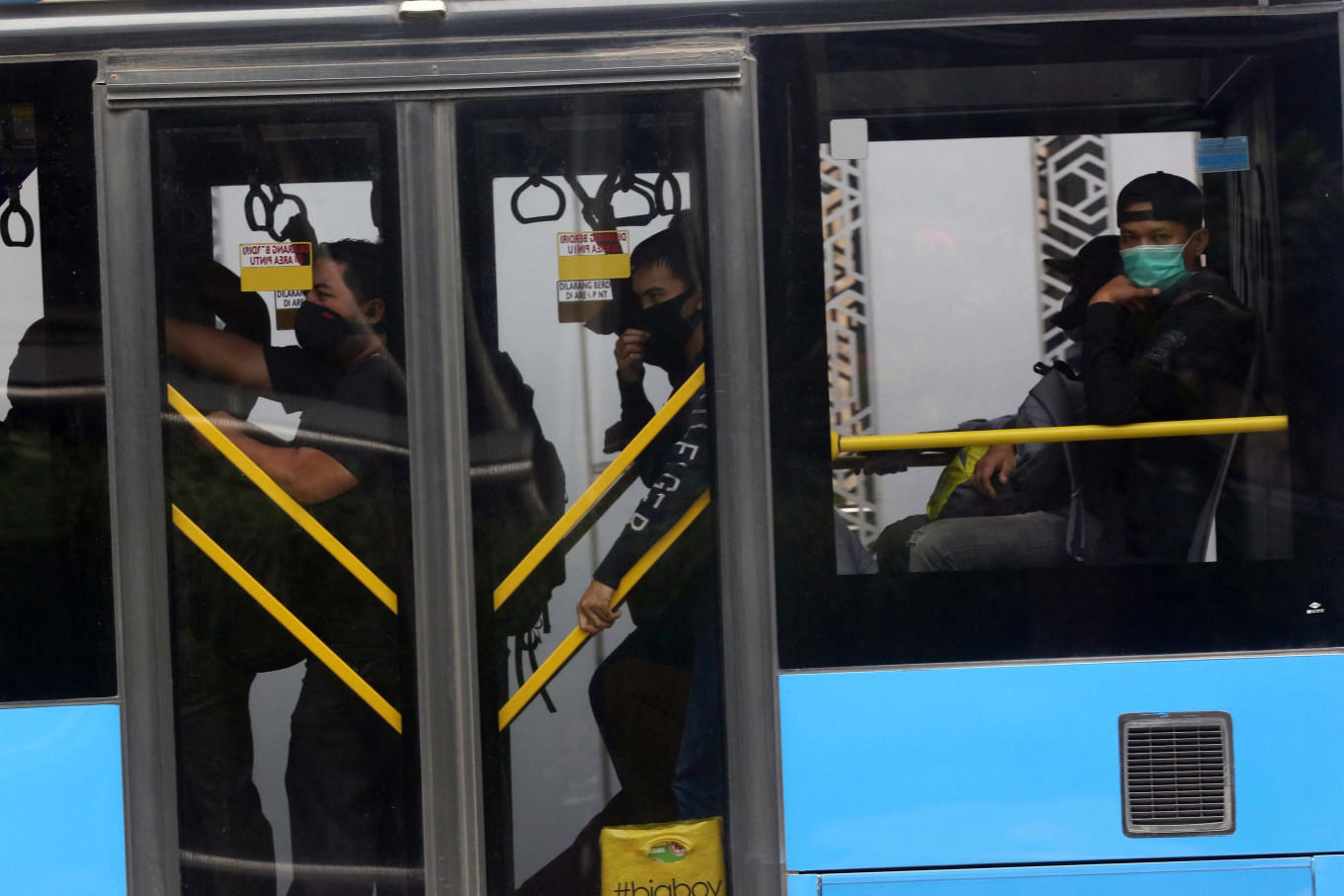Popular Reads
Top Results
Can't find what you're looking for?
View all search resultsPopular Reads
Top Results
Can't find what you're looking for?
View all search resultsPublic transportation use in Greater Jakarta plummets during COVID-19 pandemic: BPTJ
BPTJ head Polana B. Pramesti said that Jakarta in particular had initiated various restrictions including transportation restrictions in March, when a significant decline in the number of mass public transportation users had begun.
Change text size
Gift Premium Articles
to Anyone
P
ublic transportation use in Greater Jakarta declined sharply during the COVID-19 pandemic even before the implementation of the large-scale social restrictions (PSBB), according to a report compiled by the Transportation Ministry’s Greater Jakarta Transportation Agency (BPTJ).
BPTJ head Polana B. Pramesti said that Jakarta in particular had initiated various restrictions including transportation restrictions in March, when a significant decline in the number of mass public transportation users had begun.
“We have recently been very intensive in coordinating with transportation agencies across Greater Jakarta, and the result of their field monitoring has shown that ridership on public transportation has been decreasing,” Polana said in a written statement on Monday.
She said the agency noted a decline in Transjakarta passengers since March, when the city-owned bus operator recorded an average of 550,000 passengers per day, down from around 840,000 in January. The company had broken its own record of achieving 1 million passenger per day in February. In the first half of April after the COVID-19 outbreak hit the capital, the number fell further to only 83,000 per day.
The decline in passengers also occurred on the Commuter Line service provided by state-owned railway operator PT Kereta Api Indonesia (KAI), where only around 183,000 passengers per day were recorded in April, down from 598,000 passengers per day in March and 859,000 in January.
City-owned MRT Jakarta also suffered a similar problem as the country’s first subway service recorded around 5,000 passengers per day in April, down dramatically from around 45,000 passengers per day in March and 85,000 in January.
Meanwhile, another city-owned transportation service LRT Jakarta carried only around 264 people per day in April, from the previous 2,000 people per day in March and 3,800 in January.
Polana said her agency had yet to obtain data on the volume of public transportation passengers outside the capital, but she believed the number of passengers transported by feeders to each region had also decreased significantly.
“After the official PSBB status, it can be ascertained that public transportation user numbers have declined as people’s mobility has been limited,” she added.
During the partial lockdown, there has been a limitation on the operational time for all public transportation modes, whereby they only operate from 6 a.m. to 6 p.m. in Jakarta and from 5 a.m. to 7 p.m. in other areas in Greater Jakarta.
The BPTJ claimed there had been few violations of the PSBB provisions because people had been prohibited from using public transportation services if they did not meet health protocols.
Read also: 'Outbreak won't end in 14 days,' says Anies as he gears up to extend PSBB in Jakarta
Meanwhile, the agency said, most private vehicle users had complied with the correct physical distancing protocols as they used proper masks and limited the number of passengers, as noticed by officials at checkpoints.
Greater Jakarta-based intercity and interprovincial (AKAP) buses also carried many fewer passengers during the pandemic, as observed from the service data on several bus terminals under the authority of the BPTJ.
Baranangsiang Terminal in satellite city Bogor in West Java recorded an average of only 3,356 arrivals per day in March, down from 20,164 arrivals in January. Meanwhile, the average departing passenger numbers declined to 8,467 people per day in March, from an average of 50,718 people in January.
In several other terminals such as Poris Plawad Terminal in Tangerang, Banten; Pondok Cabe Terminal in South Tangerang; and Jatijajar Terminal in Depok, West Java, a significant decrease also occurred in the number of arrivals, but not in departing passengers.
The BPTJ said it had been consistently applying health protocols at the terminals since early March, based on its Circular No. 4/2020 regarding the prevention of COVID-19.










